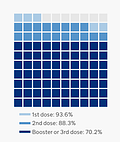MHRA move COVID vaccine safety information to routine reporting
Time called on the MHRA COVID vaccine updates, how coroner reports can improve medicines safety, and Welsh Polypharmacy guidelines.
After a fairly long gap in communications, some things that might be of interest…
MHRA COVID vaccine reporting
In March the MHRA moved to a programme of ‘routine data publication and communication of safety concerns for COVID-19 vaccines’, with the last publication here. This makes sense now, with the vaccination programme itself in a more settled phase, compared to the rapidly changing situation in 2021 were openness and transparency needed to be upfront. Public confidence remained high with good vaccine uptake during the pandemic, despite some difficult communication issues. These included rare mild cases of myocarditis and the Thrombosis with Thrombocytopenia Syndrome (TTS) that involved unusual blood clotting events associated with low platelet counts - associated with a number of deaths.
Latest reported COVID-19 vaccine uptake as of April 6th 2023.
The above figures are remarkable, given their expected level of uptake was 75% based on prior vaccination plans. Despite social media focusing on the anti-vaccine lobby, the first dose uptake shows they had a limited effect during the critical phase of the campaign. This is despite a number of adverse effects being openly discussed,
The MHRA is continuing to monitor the safety of the vaccines and report on them, but using their routine systems. The data is online. There is a likely a trade-off between specific publications and public confidence, and a point at which the provision is feeding anti-vaccine types rather than the wider public.
Overall then, I’d say that the MHRA dealt with a complex and hopefully once in a generation (lifetime?) pharmacovigilance event relatively well. If I had to pick out one learning point, I think it is around pregnant women and the messaging around the vaccines at the start of the pandemic. There’s a long academic article on this subject, but given the higher risk for pregnant women from COVID-19 some of the earlier messaging about vaccines might have worked against later messaging.
Coroner’s reports of deaths from medicines
Since 2017 I have been involved in examine the reports of deaths related to medicines reported by Coroners on Prevention of Future Deaths reports, and most recently have published a paper with a group of us who are like-minded showing that 1 in 5 coroner-reported preventable deaths involved medicines. Currently, we are concerned that not enough is being learnt from these events, or perhaps more importantly propagated to the people who are in a position to prevent future similar events.
One of my colleagues, Dr Georgia Richards from the University of Oxford, runs a substack on this project and the Preventable Deaths Tracker website which summarises the PFD data.
She also recently gave a talk on this work at the 2023 Chief Coroner’s Conference, which you can listen to here:
It’s also notable that PFDs are being used by journalists more these days. Most recently The Pharmaceutical Journal reporting on 20 deaths from obtaining drugs off the internet over the past ten years.
Of the 20 coroner’s reports warning about the supply of drugs online, 8 reports highlighted the risk of accessing medicine through online prescribers, 6 of which expressed concern that there is no requirement for them to contact the patient’s GP before prescribing.
This is particularly a problem “when somebody that’s looking to access medicines is going to a number of different providers in a short space of time”, says Duncan Rudkin, chief executive of the GPhC.
“Each of them can be doing more or less a good job at mitigating the risks associated with each transaction, but nobody’s in a position to put the whole picture together, particularly if the patient is not willing to allow their GP to be contacted … then there’s a kind of a concatenation of risks that come together.
Polypharmacy
Here’s a link to the All Wales Medicine Strategy Group’s Polypharmacy In Older People guide [PDF], which should be of interest to some readers.
Another substack readers might be interested in is Logging the World by Oliver Johnson.
If you find these posts interesting and think others might do so, spread the word
That’s all and stay safe.
Anthony
Don’t forget to report your suspected adverse effects from medicines and vaccines. In the UK, this means using the Yellow Card Scheme.







